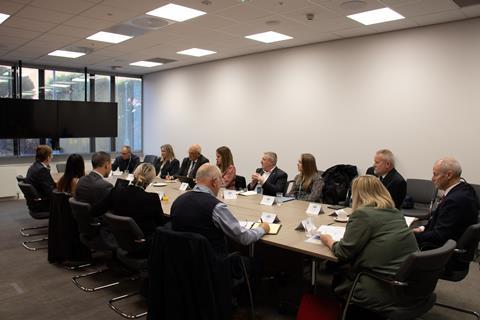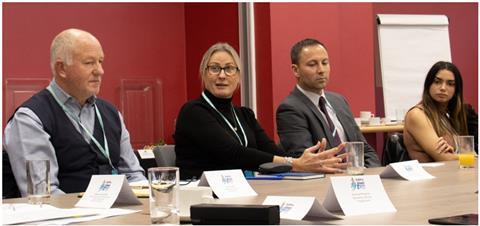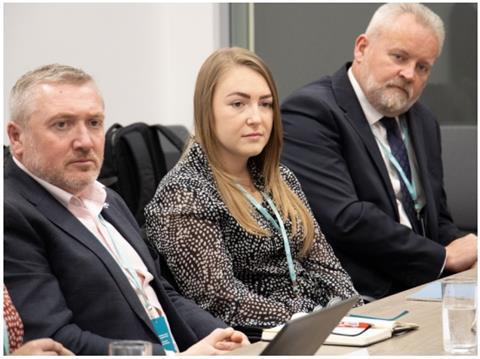Our Building the Future Think Tank, in partnership with Constructing Excellence Wales, hosted a regional roundtable in Wales. The discussions explored what the sector needs to both be resilient and create communities that are moving forward
As construction in Wales sees continuing growth, it is important to monitor progress and identify where the industry could use a boost. But there is another factor that must be considered: how the sector can continue to deliver growth while balancing other demands such as biodiversity and social value.
At the same time, there are considerations such as the country’s skills shortage and recent changes to infrastructure regulation, as well as the hoops that supply chain firms must jump through during procurement stages.
Against this backdrop, a group of sector leaders and government officials gathered in Tŷ Hywel, part of the Welsh parliament’s Cardiff estate, for a roundtable sponsored by AtkinsRéalis and RLB last year to discuss the future of construction in Wales.
The panel, hosted by the Building the Future Think Tank and Constructing Excellence Wales, explored how those working in the built environment can help to build both resilient communities and a strong construction sector.

Developing tomorrow’s talent
The Welsh construction sector presents exciting opportunities for skills growth, with Alan Jarvie, director at AtkinsRéalis, saying he saw degree apprenticeships as a promising pathway to attract diverse talent, particularly from “less privileged areas.”
Taking this point further, the industry offered numerous career paths beyond traditional roles. As Andrew Pettigrew, Morganstone’s pre-development director, explained: “Everybody seems to want to be a civil engineer.” He emphasised that colleges can help young people “understand the different roles you can undertake in construction.”
Michael Bool, director at Oochitecture, pointed to promising discussions about introducing construction-related subjects at the secondary school level, while highlighting opportunities for SMEs to “give employment opportunities back to the students.”

Nick Sullivan, head of policy and capability for the Welsh government, celebrated the vibrant small business ecosystem: “We’ve got some great micro and small businesses,” he said, asking, “How do we provide the environment and the incentive for those smaller businesses to want to grow so that they become medium-sized employers in a place rooted in the communities where they’re located?”
Rebecca Evans, the Welsh government’s cabinet secretary for economy, energy and planning, emphasised the power of early exposure to construction: “What’s more exciting than when you’re a schoolchild [than] going on to a construction site, putting the hi-vis jackets on and getting to see all the machinery? Those kind of community
benefits can be really impactful. Because how can young people or children imagine themselves in those kinds of careers if they don’t get a chance to see them?”
Strengthening industry collaboration

Another positive is the fact that the sector is embracing opportunities for enhanced collaboration, supported by new legislation. Catherine Griffith-Williams, chief executive of Constructing Excellence Wales, noted: “We’ve got enabling law and key drivers that are going to help force us to collaborate more effectively,” referring to progressive legislation like the Social Partnership and Public Procurement (Wales) Act 2023.
Evans emphasised the collaborative approach to policy development: “We’ve got our new infrastructure act, for example; we’ve updated Planning Policy Wales – but it’s important in all of those pieces of work that we do it in collaboration with the industry.”
Procurement and risk management
Industry leaders were actively working to streamline procurement processes. Jackie Pinder, managing partner for RLB’s West and Wales region, advocated for better alignment between insurance coverage and procurement requirements: “There needs to be an understanding from procurement, from central government, from local authorities, on what current businesses, commercial businesses – small and large – are actually insured for.”
Paul Morgan, regional pre-construction manager at Tilbury Douglas, promoted a collective approach to risk management, stating: “The project should own it. It’s not down to an individual. It’s not down to a company. It should be down to the project.”
With both these points in mind, Gareth Davies, construction director at Knox & Wells, highlighted the fact that public sector procurement in Wales provides a strong foundation for establishing best practice.
He sad: “The public sector generally has always been a gold standard in terms of procurement and the transparency of procurement, [and] that transparency is still there.”
Enhancing project planning and delivery
Mark Bowen, managing director at Andrew Scott, advocated for optimised tender periods to “put teams together” effectively, suggesting a minimum tender period of eight weeks to ensure proper resource allocation.
Gemma Welsher, director at Willmott Dixon, emphasised the importance of accurate project planning: “If we can just get early contract involvement from the proper market data as to what projects cost, and we allow them to go to site, we can invest more in our people.”
Project bank accounts were also a popular solution, emerging as a promising intervention for helping with responsible financial management across the supply chain.
Evans shared: “We are having some early discussions with the banks to try and make project bank accounts more user-friendly,” including developing clear flow charts and standardised templates.
“If we can just get early contract involvement from the proper market data as to what projects cost, and we allow them to go to site, we can invest more in our people.”
Gemma Welsher, director, Willmott Dixon
Leading in sustainability and social value
The industry in Wales has been making significant strides in sustainability and social value. RLB’s Pinder was optimistic about future developments: “As the younger generation comes through, we’ll see a lot more focus around biodiversity, net gain, sustainability, ESG [because] they talk that language more than we do.”
Evans highlighted breakthrough developments in sustainable construction: “The UK government recently announced the high net proposal, and that would mean that Heidelberg – a cement factory in north Wales – could become the UK’s first net zero cement factory.”
Vince Hanly, chair of the Consortium of Local Authorities in Wales (CLAW), saw sustainability initiatives as a catalyst for industry growth, describing the “sustainability and biodiversity agenda” as “an open door from the local authority” offering “lots of opportunities in terms of training new skills and new people.”
Bool also emphasised the positive impact on local economies: “You choose the right consultant and right contractor delivering work near the project, you’re embedded within that community already. So the community benefit is the fact that you’re employing people locally to do the job, and they’re then investing back in their local community.”
“You choose the right consultant and right contractor delivering work near the project, you’re embedded within that community already. So the community benefit is the fact that you’re employing people locally to do the job, and they’re then investing back in their local community.”
Michael Bool, director, Oochitecture and chair, SW Best Practice Club
The South-west Wales framework demonstrated successful integration of social and environmental values, as Pettigrew noted that his business didn’t “struggle to achieve” sustainability goals thanks to well-established “key principles of what you needed to deliver since the early days.”
Future of Welsh construction
The roundtable demonstrated that Welsh construction was entering an exciting period of transformation.
Through innovative procurement strategies, enhanced collaboration, and a strong focus on sustainability and social value, the sector was well-positioned to overcome contemporary challenges.
With industry leaders and government officials working in tandem to develop the next generation of talent whilst promoting sustainable practices, the future of Welsh construction appeared robust and promising.
The emphasis on local engagement, combined with forward-thinking approaches to project delivery and risk management, suggested that the industry was not just building structures, but creating lasting positive impacts for Welsh communities.
Around the table
Chair: Jordan Marshall, special projects editor, Building
Michael Bool, director, Oochitecture and chair, SW Best Practice Club
Mark Bowen, managing director, Andrew Scott
Gareth Davies, construction director, Knox & Wells
Rebecca Evans MS, cabinet secretary for the economy, energy and planning, Welsh Government
Catherine Griffith-Williams, chief executive, CEWales
Vince Hanly, chair, CLAW
Alan Jarvie, director, AtkinsRéalis
Sophie Latham, associate, Blake Morgan and co-chair, G4C Wales
Paul Morgan, regional pre-construction manager, Tilbury Douglas
Andrew Pettigrew, operations director, Morganstone
Jackie Pinder, managing partner, West and Wales, RLB
Nick Sullivan, programme manager, foundational economy, Welsh Government
Gemma Welsher, director procurement, Willmott Dixon




























No comments yet